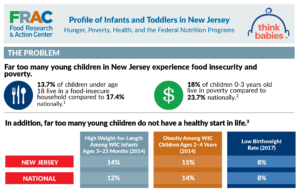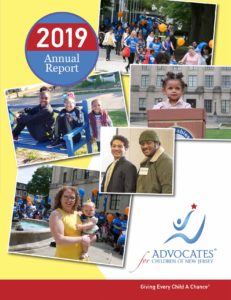 New Jersey lags behind nationally when it comes to tapping into federal programs to feed young children living in low-income households that struggle to put food on the table, according to new research from the Food Research & Action Center and the Think Babies™ campaign.
New Jersey lags behind nationally when it comes to tapping into federal programs to feed young children living in low-income households that struggle to put food on the table, according to new research from the Food Research & Action Center and the Think Babies™ campaign.
View NJ’s Fact Sheet.
Just 67 percent of eligible New Jersey infants benefit from the Special Supplemental Nutrition Program for Women, Infants, and Children (WIC), compared to 77 percent nationally. This program provides critical nutrition support to pregnant women, infants and toddlers.
“This is just unacceptable,’’ said Cecilia Zalkind, president & CEO, Advocates for Children of New Jersey. “Hunger and poverty are especially damaging to very young children. Children grow most during the first three years. Without proper nutrition, that growth is severely threatened, requiring expensive interventions later in life.’’
For the Supplemental Nutrition Assistance Program (SNAP, also known as food stamps), New Jersey also lags behind, reaching only 57 percent of young children, compare to 66 percent nationally.
“No child should face hunger, especially when federal dollars are available to feed these children,’’ said Adele LaTourette, director, Hunger Free New Jersey. “By maximizing participation in federal nutrition programs, we can greatly reduce childhood hunger in New Jersey, improving child health and ultimately academic success.’’
Nearly 14 percent of New Jersey children under 18 live in food-insecure households, compared to 17.4 percent nationally, according to an analysis of 2014-16 Current Population Survey-Food Security Supplement. At 18 percent, an even higher percentage of New Jersey children 0 to 3 years old live in poverty.
New Jersey posted a modest increase in participation in the Child and Adult Care Food Program (CACFP), which provides meals to young children in child care. Total CACFP participation among young children inched up 4 percent from 2013 to 2018. That increase, however, is far below the national jump of 25 percent. CACFP participation in private homes caring for young children actually dropped 20 percent during that time.
“There are federal dollars available to feed our youngest children and we are not taking advantage of those funds,’’ Zalkind said. “Boosting participation in these programs among families will help to build a stronger foundation for our youngest children.’’
“SNAP serves as the first line of defense against hunger and is critical to keeping and lifting low-income households — including those with children — out of hunger and poverty,” LaTourette added. “WIC helps pregnant women, new mothers and children eat healthier. Children who participate in WIC also are likely to have better academic outcomes than low-income children who do not benefit from the program.”
ZERO TO THREE created Think Babies to make the potential of every baby a national priority.
Think Babies state partner Advocates for Children of New Jersey is collaborating with Hunger Free New Jersey and others to advance policies and investments benefiting infants, toddlers and their families, particularly those that promote good nutrition and strong physical and emotional health.
Funding partners for Think Babies include the Robert Wood Johnson Foundation and the Perigee Fund. Learn more at www.thinkbabies.org.
###

2019_11_04_Profile_of_Infants_and_Toddlers_in_NJ_Receiving_WIC_and_Snap
 New Kids Count Data 2019 Dashboard!
This interactive Data Dashboard features dozens of measures of child well-being at the state and county level, in the following areas: demographics, child and family economics, child health, child protection, school children, and teens and young adults. The dashboard also includes county-level race data for several indicators.
New Jersey Kids Count 2019: The State of our Counties pocket guide
The annual printer-friendly Kids Count pocket guide is also available, featuring a selection of the indicators available on the data dashboard..
Counties At-A-Glance
Get a snapshot of the well-being of children from our County-A-Glance fact sheets, which include, for the first time, county-level race data. This year, county rankings were not calculated due to data availability; instead, each county is compared to the state.
New Kids Count Data 2019 Dashboard!
This interactive Data Dashboard features dozens of measures of child well-being at the state and county level, in the following areas: demographics, child and family economics, child health, child protection, school children, and teens and young adults. The dashboard also includes county-level race data for several indicators.
New Jersey Kids Count 2019: The State of our Counties pocket guide
The annual printer-friendly Kids Count pocket guide is also available, featuring a selection of the indicators available on the data dashboard..
Counties At-A-Glance
Get a snapshot of the well-being of children from our County-A-Glance fact sheets, which include, for the first time, county-level race data. This year, county rankings were not calculated due to data availability; instead, each county is compared to the state.





